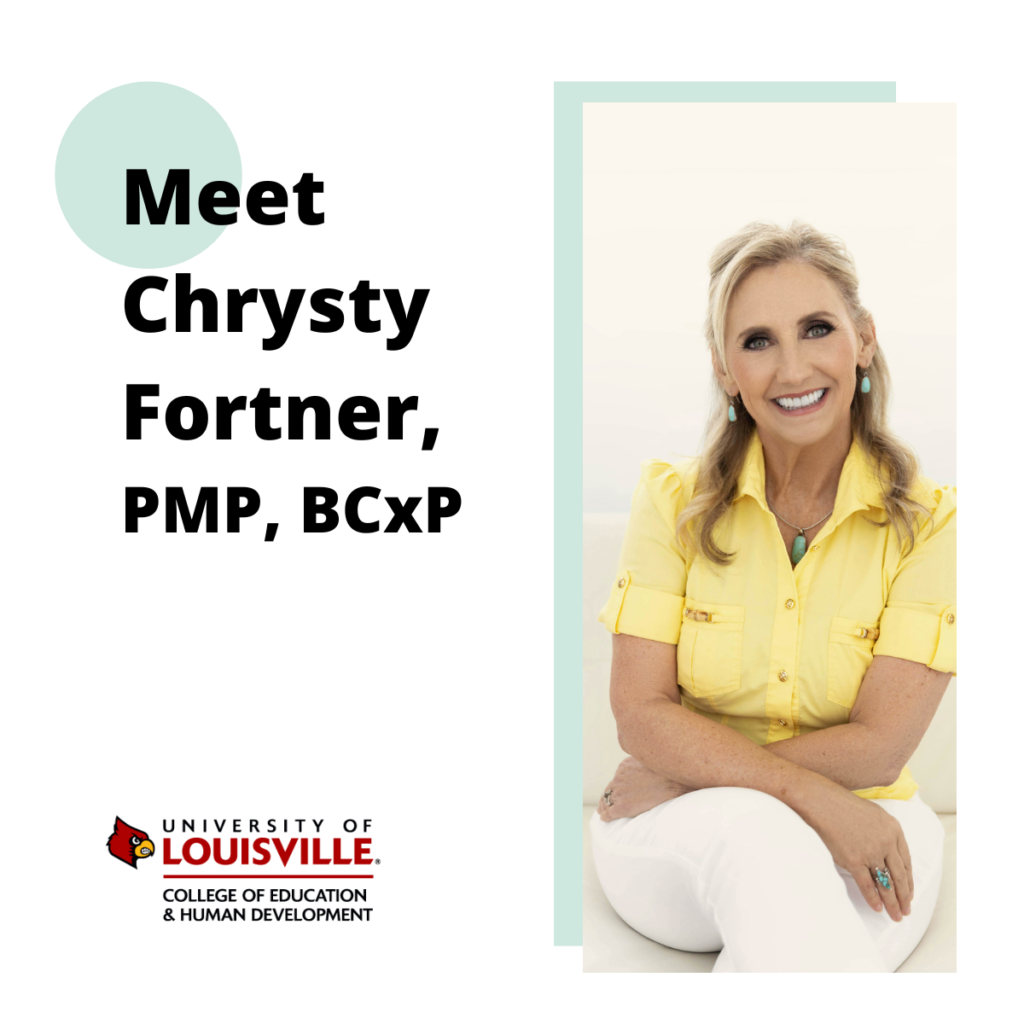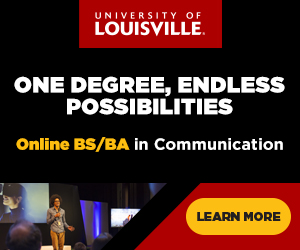
New Online Program: The Undergraduate Certificate in Climate, Equity and Opportunity in the Workplace


Chrysty Fortner, PMP, BCxP, and BSOLL – LTOD graduate is a UofL Online grad who completed a BS in Organizational Leadership & Learning, with a focus in Leadership, Training, & Organizational Development. She is currently employed at ECHO Power Engineering as a Director of Programs and Special Projects. Today, we’ll be reviewing her answers to some of our student spotlight questions to better understand her program and how it will prepare her for future career success! As Chrysty notes, “At 55 I started this program because I wanted to set my sights on career advancement between 55 and retirement, this program is how I chose to address it. The experience has been one of the most empowering journeys in all of my working years. I am literally ready for anything life has to offer!”
Let’s dive into her responses to our questions!
Q: Why did you select the OLL program?
CF: I researched relentlessly. It’s how I am made. I was searching for two specific outcomes: finding a program that would evaluate credit hours for past work experiences and ensuring the program could utilize my old (old) school credits to shorten the bridge to graduation.
Q: What are you enjoying most about the program?
CF: The courses are highly relevant to today’s professional challenges. Addressing the social dynamics as well as the advances in processes and technology have made what I’m learning at this stage of my career invaluable. I am becoming a more confident critical thinker, while incorporating new and old ideas into my work.
Q: Do you feel the program is providing the skills you need to be successful in your career?
CF: Most definitely, and certainly skills I could have been using the past thirty years to navigate tough people, tough situations, and tough work environments. I can say this with certainty, it’s never too late to validate the tools you already have and learn new skills altogether.

Q: Would you recommend the program? Why?
CF: I highly recommend the program. After reviewing my past college credits with my advisor, it was discovered that I could earn thirty-six credit hours from past experience and needed only twelve program-specific courses to graduate. The BSOLL program was designed to help learners like me attain those credit hours and is flexible enough to allow for a course load to fit my objectives and schedule. Additionally, the obvious mission for both faculty and advisors is to, “…help them cross the finish line!”
Q: What is your new employer’s name and what is your new title?
CF: Director of Programs and Special Projects at ECHO Power Engineering.
Q: Any additional comments you would like to share?
CF: At 55 I started this program because I wanted to set my sights on career advancement between 55 and retirement, this program is how I chose to address it. The experience has been one of the most empowering journeys in all of my working years. I am literally ready for anything life has to offer!
Curious about the Leadership, Training, & Organizational Leadership track? Click here and learn more!

The University of Louisville’s Online Learning division offers prospective students the opportunity to earn their bachelor’s degree in Communications. Offered as a BA or BS, both communication degrees are effective in preparing online students for a wide range of career opportunities. However, deciding which degree path to pursue can be a personal choice based on your individual career goals.
The Bachelor of Arts (BA) focuses on the overall enhancement of oral and written communication skills, as well as developing your understanding of how we as humans communicate with one another, combined with courses in liberal arts and a variety of additional elective options. The (BS) in Communications deepens your knowledge of skills in such areas as copywriting, public speaking and focuses more on a student’s targeted career path within the communications field.
Highlighted below is a breakdown of the two communication degree options offered at UofL, along with career outcomes and potential internship opportunities.
Bachelor of Arts in Communication:
The BA in Communication is offered in a 121 credit-hour format. The BA requires 18 hours in core communication disciplines and 18 hours in communication electives, focusing on delivering a wider breath of knowledge in areas like foreign language and liberal arts. Students interested in pursuing their BA in communications gain a broader understanding of how we communicate with one another with additional core requirements in a foreign language and other social science areas (such as sociology, psychology or women’s, gender and sexuality studies).
Graduates from the B.A. in Communication have a broader understanding of the communication field as a whole and the option to pursue multiple career paths. Some options of potential career opportunities for graduate from this degree include; TV and cable companies, radio stations, advertising agencies, news organizations, print publishing companies, event firms and many more.
Bachelor of Science in Communication:
The BS in Communication is offered in a 121 credit-hour format as well. However, the BS option requires 27 hours in core communication disciplines and 21 hours in communication electives. This degree option focuses more on applied communication with core requirements in areas like copywriting, newswriting, public speaking, debate and more. In addition to a more targeted track option within the communication field of study, students are also required to complete an internship (3 credits) in order to graduate. By requiring a mandatory internship, students will gain hands-on experience within their chosen field of interest. Along with the internship requirement, additional core communication courses are required in the following classes:
The University’s communication and advising departments work with online students in the BS Communications track to find internships that are best suited for their professional goals. Several examples of current internship opportunities for communication majors include:
Emma Bowen Foundation – The Emma Bowen Foundation promotes a more diverse industry by recruiting promising students of color and placing them in multi-year paid summer internships at some of the nation’s leading media and tech companies, such as FOX Television Stations, Hearst Television, The Financial Times, NFL, Paramount, and Warner Bros. Discovery. Whether you’re interested in being a producer, a journalist, a web developer, an engineer, a business executive, a PR agent, a sales representative, or any other career in media or tech, the EBF Internship is here to help you get your start.
Sports Radio America – SRA is seeking a Sports Writer intern. The intern will work under the supervision of the Managing Editor. Provide game notes, reports, and recaps for the university attendees. If accessible, provide news and insights to high school sports in the surrounding area. If approved for media credentials by the Sports Information Department, cover post-game press conferences, provide pictures, videos, and sounds from games covered.
Make-A-Wish Ohio, Kentucky and Indiana – Assist the team with the planning of fundraising events, stewardship of donors, and administrative support of fundraisers including Walk for Wishes, Gala and many more.
Signature Inspire Foundation – Social Media Intern to manage the social media of Signature Inspire Foundation. Utilizing all social media platforms to support Signature Inspire Foundation’s programs & services and increase awareness of the foundation.
For a complete list of available internship opportunities for communication majors, click here.
Earning a degree in communication opens the doors to ample career opportunities. No matter which communications degree path you choose, a BS or a BA, the expertise you develop in analyzing and implementing communication methods will afford graduates the opportunity to increase their portfolio within the communications field.
Our graduates go on to succeed in a variety of careers—from producer to technical writer to HR manager to podcast personality and so much more. Many career paths chosen by communication graduates increase their annual salary as well. According to the U.S. Bureau of Labor Statistics, if you chose a career as an editor, the median annual salary is $63,400. Or an advertising or marketing manager with minimum requirement of a bachelor’s degree, the median annual salary is $141,490 with the expected growth rate in the U.S. to be an above average 6% between 2019 and 2029 (bls.gov).
No matter where you are in your pursuit of your degree, the University of Louisville’s Online Learning department is here to help you succeed. With three application deadline options, rolling admissions and three term start dates – the options for incoming or transferring students are plentiful. To begin or continue your degree in this field – start your application today, by clicking here. For a complete list of all programs offered online, view the program finder for more information.
By earning her Bachelor of Science in Communication with University of Louisville, Maggie gained a newfound confidence in herself, all thanks to a 100% online education that allowed her to play on her strengths and advance her future.
When Maggie decided to go back to school, a traditional classroom setting didn’t seem like the right fit for her. Previously attended and then withdrawn from an on-campus program at another university, she decided to explore online learning options with the University of Louisville–which turned out to be perfect for her and her situation.
With UofL’s online bachelor’s in Communication program, Maggie received the same education as any traditional student while maintaining the full-time job she was working to pay for classes. More notably, she found herself empowered by the online learning environment to overcome her social anxiety and more successfully interact with classmates and teachers.
“I felt like I needed [a degree] to be who I was.”
Through her education with UofL, Maggie embarked down not only an educational path but also a road to self-discovery. She learned more about herself, and emphasizes that earning her degree online with UofL helped her become the person she is today.
Since graduating, Maggie has gone on to land jobs in marketing and social media copywriting.
The Bachelor of Science in Communication degree at UofL is designed to build expertise around various communication strategies, cultures, channels and media types. Ultimately, the degree prepares students for careers in various fields including communications, marketing, advertising, broadcasting, journalism and public relations.
UofL also offers a Bachelor of Arts in Communication, which requires more liberal arts credits and excludes the internship portion.
Covering many different industries and careers, UofL Online offers a wide variety of 100% online degree and certificate programs–all of which deliver quality online education to non-traditional students who are not able to come to a physical campus and want to earn a college degree or certificate to start or advance their career.
Maggie went back to school to fill a void and feel more confident about herself.
Check out our YouTube page to hear testimonials from other UofL Online programs and students or read more of real student stories here.